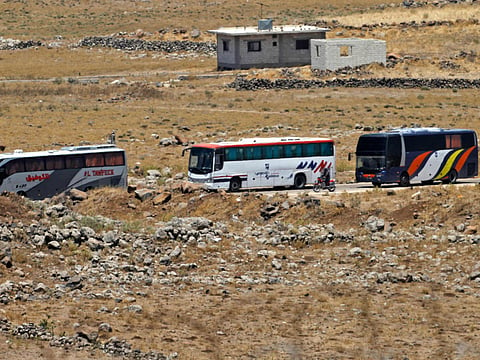Syrian rebels set to evacuate Golan frontier
Regime offensive has restored Syrian government control over a swathe of the southwest

Beirut: Syrian rebels are due to start evacuating the border area with the Israeli-occupied Golan Heights on Friday, leaving for rebel-held areas of the north under a surrender deal that will restore President Bashar Al Assad’s control of the frontier.
“We are awaiting the start of the operation and God willing it will happen today,” Hammam Dbayat, the governor of Quneitra province, told Reuters, as buses prepared to transport out rebel fighters to the northwestern province of Idlib.
Reuters footage filmed from the Israeli side of the frontier showed men climbing into trucks piled high with belongings and leaving Al Qahtaniya village at the Golan frontier. It was not clear where they were headed.
Tens of thousands of people have been sheltering at the frontier since the government offensive began one month ago.
With the Russian-backed offensive closing in, rebels in Quneitra agreed on Thursday to either accept the return of state rule, or leave to Idlib province in the north, echoing terms imposed on defeated rebels elsewhere in Syria.
Idlib’s population has been swollen by Syrians fleeing from Al Assad’s advances elsewhere.
The offensive has restored Syrian government control over a swathe of the southwest, strategically vital territory at the borders with Jordan and Israel.
It has been one of the swiftest military campaigns of the seven-year-long war.
The United States, which once armed the southern rebels, told them not to expect its intervention as the offensive got underway.
Many surrendered quickly.
While swathes of Syria remain outside his control, Al Assad’s advances over the past two years have brought him ever closer to snuffing out the armed rebellion that grew out of a civilian uprising against his rule in 2011.
It leaves the insurgency with one last big foothold - a chunk of territory in the northwest at the border with Turkey stretching from Idlib province to the city of Jarablus northeast of Aleppo.
The deployment of the Turkish military in this area will complicate further gains for Al Assad.
Large areas of the northeast and east also remain outside Al Assad’s grasp.
These areas are held by Kurdish-led militias, supported by 2,000 US troops on the ground.
Dbayat said it remained unclear exactly how many fighters would leave Quneitra, but the government had so far prepared 45 buses.
“We are ready to move the militants out of the area, and if it is completed, we will immediately provide the necessary services to residents, including electricity and water.”
State TV said 10 buses had entered a village in Quneitra on Thursday night for the evacuation of insurgents “who refuse to settle with the state” towards rebel territory in the north.
The offensive sparked the largest exodus of the war, uprooting more than 320,000 people mostly towards the southern borders.
Both neighbours Israel and Jordan said they would not take in refugees.
Many people left the frontier with Jordan after government forces took the Nassib border crossing and rebels in Deraa province agreed a surrender deal last week.



